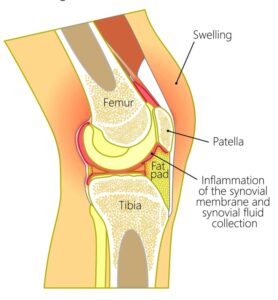Knee PVNS Specialist

Do you have a history of synovitis or of PVNS – pigmented villonodular synovitis in the knee or any other joint? Are you experiencing pain, tenderness or rapid swelling in the knee joint? Doctor Riley J. Williams provides diagnosis as well as surgical and nonsurgical treatment options for patients in Manhattan, Brooklyn, New York City and surrounding areas who are experiencing symptoms of synovitis or knee PVNS. Contact Dr. Williams’ team today!
What is pigmented villonodular synovitis (PVNS)?
Pigmented villonodular synovitis (PVNS) is a condition that most commonly occurs in the knee joint but can also affect other joints in the body. PVNS occurs when the synovium (knee joint lining) overgrows to the point that it causes pain, swelling, mechanical symptoms and sometimes arthritis. Synovium is a thin layer of tissue that lines the joint and synthesizes joint fluid which facilitates smooth joint motion. If an individual suffers from pigmented villonodular synovitis, the synovium produces excess fluid, which causes the join to swell and makes movement painful. Pigmented villonodular synovitis of the knee typically occurs in individuals ranging in ages 20-50; nearly 80% of all PVNS cases occur in the knee joint. PVNS can occur as an isolated lesion or growth (localized) or present as a widespread diffuse pattern. Doctor Riley J. Williams, orthopedic knee specialist serving Manhattan, Brooklyn, New York City, NY and surrounding areas has extensive experience in diagnosing and treatment knee PVNS and other joint related conditions.
What are the symptoms of PVNS?
There are two forms of pigmented villonodular synovitis: localized and diffuse. The localized form occurs in only one area of the knee. The diffuse form can be more difficult to treat because it involves the whole knee and is more widespread. With both localized and diffuse knee PVNS, the symptoms may come and go.
Localized PVNS symptoms:
- Pain
- Significant swelling
- Catching or locking of the knee
- Instability of the knee
Diffuse PVNS symptoms:
- Pain
- Swelling
- Stiffness
- Hemarthrosis (collection of blood in the joint space)
How is PVNS diagnosed?
Dr. Williams will perform a physical examination of the knee. He will also order x-rays and an MRIs, which will provide images of the damaged knee. He may need to take a biopsy of the injury to determine if its pigmented villonodular synovitis. A procedure must be done to take a biopsy of the knee, in which a tissue sample can be examined under a microscope. Another procedure that the patient may need is joint aspiration which means Dr. Williams will remove fluid from the joint to be examined. If the joint fluid is bloody, it could indicate PVNS.
What are the treatment options available?
Non-surgical treatment:
Pigmented villonodular synovitis is a progressive, degenerative disease; this mean that PVNS will continue to worsen and usually will require surgery. It is believed that some patients with PVNS have a protein that is sometimes found in the cell lining the damaged joint called CFS-R1. Researchers are developing drug therapy that may be effective for fighting CFS-R1. Dr. Williams can explain the treatment options and can help determine if you are a good candidate for clinical trials for the drug therapy. Other non-surgical treatments may include resting the knee when there is a flare up, and using ice for pain and swelling. It is important to maintain a regular exercise routine to maintain mobility and the range of motion of the knee.
Surgical treatment:
Surgery is often very successful for localized PVNS. Surgery is performed to remove the growth or tumor that is caused by pigmented villonodular synovitis. Dr. Williams will discuss which type of surgery is suitable for you and may include one or more of the following:
- Knee Arthroscopy with synovectomy
- Knee arthrotomy with synovectomy
- PVNS Lesion removal
For more information on pigmented villonodular synovitis (PVNS) and the treatment options available, please contact the office of Riley Williams, MD, orthopedic knee specialist serving Manhattan, Brooklyn, New York City, NY and surrounding areas.
Locations
610 W 58th Street
New York, NY 10019
148 39th Street, 7th Floor
Brooklyn, NY 11232




